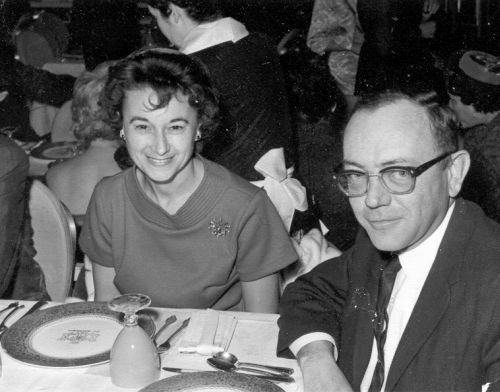
Father’s Day. I’m not sure what I can say about my father that hasn’t been said already. If you’ve read this entry from 2009, you know most of his history. Maybe it’s time to lay out some more.
Frank W. Duntemann was, by his own definition, a successful man. He had a gift for aphorism, and he told me more than once: “Success means being at no one’s mercy but your own.” He wanted me to be successful as well, and did everything he knew how to urge me along. Straight As were a requirement at our house, and I delivered them. So were courtesy, respect, and correct English. He taught me how to teach myself things–good lord, it took me decades to appreciate the value of that lesson alone. He told me life was hard work, and so what? Successful people worked hard. They were also careful, and made smart choices. He summed it up with another aphorism: Kick ass. Just don’t miss.
In other words, weld enthusiasm to discernment. I had plenty of enthusiasm. Discernment came later.
And he worried about this. Much of my free time (at least free time that wasn’t spent reading) I spent banging on my grandmother Sade Duntemann’s cranky old Understood Standard #5, which she had given me when I was ten. I was writing science fiction stories. I showed him the ones I considered good, and he agreed. They were good. They were maybe a little too good, especially for a 14-year-old. My high school had teacher conference nights, and my parents always went. One of my English teachers told him something that made him proud, and evidently scared him (as he might have put it) shitless: “Jeff is an absolutely amazing writer. You should encourage him. I’ll bet he could make money with his stories!”
It was assumed that I would follow in his footsteps and become an engineer. And it’s true, I was always tinkering something up in the basement. But as my high school years passed, I spoke more and more of getting published, and not just writing, but being a writer.
He was gentle about it, but firm: Writing was not a good way to make a living. Trying to make a job out of writing was a good way to starve. Better to be an engineer, and write in your spare time…
The lessons stopped in the fall of 1968, when my father was diagnosed with advanced oral cancer caused by his two-pack-a-day cigarette habit. I was 16. My mother was completely devoted to caring for him, and my sister and I more or less grew up on automatic. I was accepted at engineering school, and bailed after a single semester. I didn’t fail out, exactly, but I could tell it wasn’t going to work.
Alas, I had no clue about what would.
I enrolled at DePaul University’s Department of English, figuring I could always be a teacher. After all, I was good at explaining things. Again, I got straight As, and in the fall of my senior year I sold my first SF story, to Harry Harrison’s anthology Nova 4. I got $195 for it. My father pointed out that it was a good start, but I really needed a backup career. I still had no idea what to do with my life. After I graduated I took a job as a Xerox machine repairman, continued to teach myself electronics, and continued to write. I taught myself programming, and built my own computer out of loose parts. On a whim I began writing articles about home-built computers, and sold them, mostly to Wayne Green but later to Byte, and much later to PC Tech Journal and others. The money was thin, but over time it began to add up.
Frank W. Duntemann died on January 11, 1978. I was 25. Very weirdly, when he died I was under general anaesthesia at Evanston Hospital, getting a hernia fixed. Even more weirdly, while I was under I had a dream: I stood alone in space, gazing at a titanic wall of books on shelves, thousands upon endless thousands of books, extending to infinity in every direction.
People don’t dream normally under general anaesthesia, which is, after all, an artificial coma. I was hallucinating, surely. Or had my father taken a quick detour on his way to the Beatific Vision, and, figuring he had time to stick only one image into my head, chose an image that his weird nerdy writer son would understand?
If so, I think I know what he was saying: Go for it, dammit!
I did. That day was what writers call my “dark moment.” It passed, as dark moments do, and my life began to fall into place. Within a year I’d gotten a huge promotion and a transfer to a programming job at Xerox HQ. Within two years I’d sold three more SF stories, and within three years I had two nominations on the final ballot of the Hugo Awards. Within five years I nailed a contract for my first technical book. Within ten years I was Editor-in-Chief of a technical magazine with 217,000 readers. Within twenty years I was co-owner of Arizona’s largest book publishing company, and had a quarter million books in ten languages kicking around the world with my name on them.
I kicked ass. I didn’t miss. The kickin’ just took a little longer than either of us expected.
I wobble between two extremes on Father’s Days. The sentimental, mystical part of me assumes that he’s somehow gotten word that his kid done good–and the hard-bitten, rationalist part wants to wring his neck for checking out before I could prove him wrong and rub his nose in it.
Here’s the moral, as I see it: Fathers, believe in your sons as they create their own futures. Sons, cut your fathers some slack. They couldn’t see your futures while you were creating them…
…or could they?










